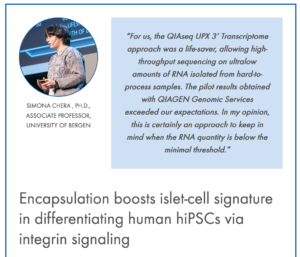Our study on iPSC-derived human pancreatic progenitors in vitro differentiation is now published:
- The main goal of this study was to characterize the impact of cell confinement on the pancreatic islet signature during the guided in vitro differentiation of alginate encapsulated human induced pluripotent stem cells (hiPSCs).
- Encapsulation of pancreatic endocrine progenitor efficiently improves the differentiation outcome by increasing both the proportion of hormone-positive cells and the fraction of insulin cells co-expressing key β-cell markers.
- Encapsulation enables proteome adaptations of the differentiating cells towards a more islet-like fingerprint in a stage-specific manner, where the encapsulation of the first differentiation stages promotes early differentiation signals, while the encapsulation at a later differentiation stage promotes hormones and factors involved in hormone synthesis and secretion.
- These effects of alginate are relayed through integrins, which presumably translate the pressure elicited by the confinement of cells in the alginate matrix into signalling cascades.
Continue your reading here:
Authors: Legøy TA, Vethe H, Abadpour S, Strand B, Scholz H, Paulo JA, Raeder H, Ghila L, Chera S. Scientific Reports 2020 Jan 15, 10:414 PMID: 31942009
DOI information: 10.1038/s41598-019-57305-x
Our work was featured on a recent QIAGEN’s campain related to QIAseq UPX 3′ Transcriptome Kit, for more details click here.

